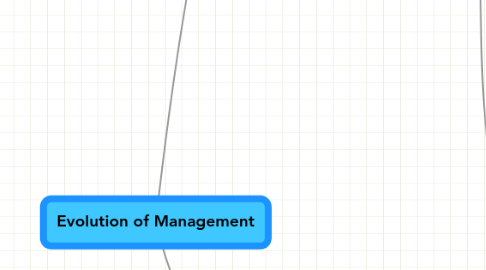
1. Introduction
1.1. Evolution
1.1.1. Construction of Pyramids
1.1.2. Great Wall of China
1.1.3. Roman Empire's decentralised armies
1.1.4. Venice's Inventory Control
1.1.5. Industrial Revolution
1.1.5.1. Introduction of classical theory
1.1.5.2. @ 18th Century
1.2. Classical Theory (1890)
1.2.1. Weber
1.2.1.1. rational organisation
1.2.1.2. Bureaucy
1.2.2. Talyor
1.2.2.1. Increase productivity
1.2.3. Fayol
1.2.3.1. administrative management
1.2.4. Only Interested in WORK
1.3. Human Relations Theory (1930)
1.3.1. Elton Mayo
1.3.1.1. Groups of Workers
1.3.1.2. Social relationships
1.3.1.3. informal organisations
1.3.2. Emphasis on the WORKER
1.4. Systems Theory (1950)
1.4.1. Dr. Eric Trist
1.4.1.1. Work must be done as a team!
1.4.1.2. Classical Theory + HR Theory
1.4.1.3. Worker + Work = Efficiency
1.5. Contingency Theory (1970) Situational Theory
1.5.1. Alignment of organisation to external environmental changes.
1.5.2. Worker + Worker
1.5.2.1. P•E•S•T
1.5.2.1.1. Economic
1.5.2.1.2. Technology
1.5.2.1.3. Social
1.5.2.1.4. Politics
1.6. Total Quality Management (1980)
1.6.1. Japanese Management Style
1.6.2. Organisation must orientate towards customers
1.6.3. 6 Sigma
1.6.3.1. Minimum errors 0.034%
1.7. Learning Organisation (1990)
1.7.1. Sharing of knowledge
1.7.1.1. Training
1.7.1.2. Experience
1.7.1.3. Causes INNOVATION
1.8. Technology Driven
1.8.1. Competition
1.8.1.1. Success of organisation
1.8.1.1.1. depends on success of products
1.8.1.1.2. resource based
2. Classical Theory
2.1. Weber Max
2.1.1. bureaucracy / bureaucratic org
2.1.1.1. Division Labour
2.1.1.1.1. Not so relevant in developed countries
2.1.1.2. Authority Hierarchy
2.1.1.2.1. Relevant but must exercise empowerment
2.1.1.3. Formal Selection
2.1.1.3.1. Relevant!
2.1.1.4. Formal Rules and Regulation
2.1.1.5. Impersonality
2.1.1.6. Career Orientation
2.1.2. Rational (efficient) org
